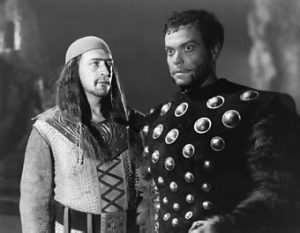 Following the admittedly rather quiet film club month for Throne of Blood, we move to the last film club edition of the year. This time, it is Orson Welles’s turn to for a Shakespeare adaptation with this 1948 film Macbeth.
Following the admittedly rather quiet film club month for Throne of Blood, we move to the last film club edition of the year. This time, it is Orson Welles’s turn to for a Shakespeare adaptation with this 1948 film Macbeth.
While the content of Welles’s version is arguably somewhat closer to Shakespeare than Kurosawa’s, it is not necessarily so in terms of the work’s meaning. The differences between the two films and their relationship with their source material are in fact pretty interesting. Welles’s Macbeth is to a fair extent a noir film, and although this may be more pronounced in its visual than narrative aspects, it could be argued that it shares noir’s concerns also thematically, concentrating on questions of society and the human psyche. In comparison, it could similarly be said that Kurosawa’s Throne of Blood is less concerned with individuals and society, and moves on a more universal level, being more concerned with the question of the nature of nature itself.
One aspect in which this could be said to be reflected is the depiction of the witches, and how the two directors chose to make use of them. While in Kurosawa the witch character can be seen as inhabiting the domain of the supernatural, in Welles the witches rather appear unnatural, representing paganism and eing contrasted with the character of the priest, which Welles introduced to the story.
This is of course only one way to approach the two films, and it would be interesting to hear your take on the above.
Other things to compare in the films are the camera and acting techniques and the use of interior and exterior spaces, which both directors utilise quite masterfully. Yet, both Welles and Kurosawa make many of the outdoor scenes look surprisingly staged, perhaps as a nod to the source materials. Although at least in Welles’s case also budgetary reasons may well have contributed to this aspect of the work, with the film having been shot on a relatively small budget in just a little over three weeks.
There is of course much more to be said about Macbeth, which was Welles’s fifth film, made when the director was still only 33 years old. It was not even the first time that he had tackled the story professionally, having already staged Macbeth twice (1936 and 1947) with an all-black cast in the so-called Voodoo Macbeth performances. It would not be the last time that he worked on a Shakespeare play either — his very next directorial work following Macbeth was Othello (although he did act in a number of films between the two, including Carol Reed’s The Third Man).
I do hope that you find Welles’s Macbeth as interesting as I do. The film is widely available, with North Americans having both DVD and Blu-ray versions available, while European based fans have to make do with a DVD.
Also, in case someone else is up for it, it could be interesting to watch also Roman Polanski’s Macbeth from 1971. I have not yet seen it, but it is supposedly rather dark, and at least partly so because it was his first film since the brutal murder of his wife by the Manson Family.
In January 2013 we will be continuing with film adaptations of theatre classics, this time watching Kurosawa’s The Lower Depths. For the full film club schedule, take a look at the film club page.







Its been a while since I’ve seen Welle’s Macbeth, but I enjoyed it a lot (I confess I’ve never seen it on stage or read the play). Watching it after Throne of Blood, the things which struck me were:
1. The ‘moving forest’ sequence was so similar I wondered if Kurosawa had seen it.
2. Throne of Blood is vastly more cinematic, I know Welles was constrained by the budget, but it often seemed much more studio bound.
3. I have no idea why Jeanette Nolan was cast as Lady MacBeth, she seemed wildly out of her depth, to the extent that it nearly spoiled the whole film for me.